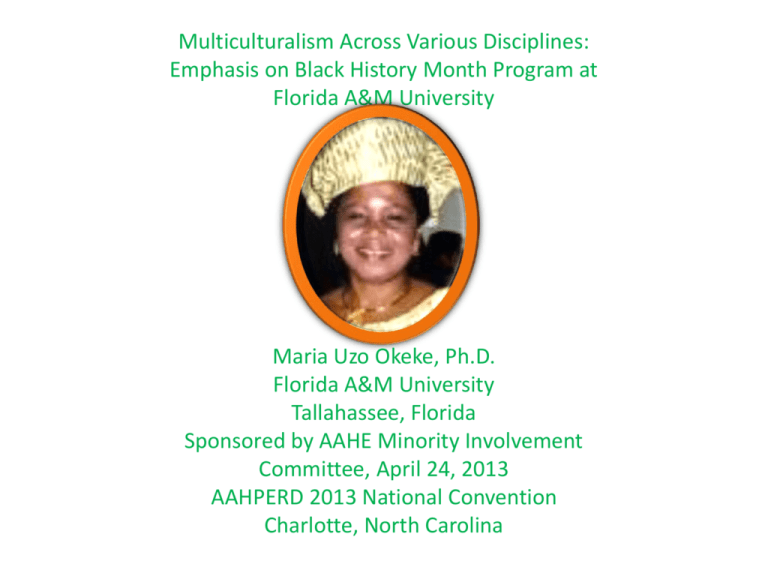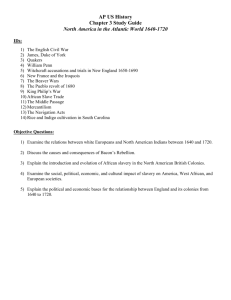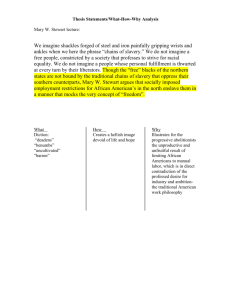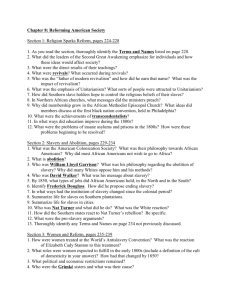Multiculturalism Across Various Disciplines
advertisement

Multiculturalism Across Various Disciplines: Emphasis on Black History Month Program at Florida A&M University Maria Uzo Okeke, Ph.D. Florida A&M University Tallahassee, Florida Sponsored by AAHE Minority Involvement Committee, April 24, 2013 AAHPERD 2013 National Convention Charlotte, North Carolina Black Women Moving Forward in American History and Culture Abstract • • • • Spring semester of 1995 marked the inception of the Black History Month program coordinated by the FAMU College of Education Department of Health and Physical Education. This unique and intriguing program as of today has turned into an annual event that is hosted by a syndicate of dedicated professionals representing various disciplines at Florida A&M University. The 2012 National Black History Month theme was: Black Women Moving Forward in American History and Culture. The primary purpose of this project was to plan, implement, and evaluate the black history month program in a historically black institution of higher learning. The secondary purpose was to expose the Health for Modern Living students to community service learning experience utilizing Health Education program planning and implementation model In addition, this section will further discuss the multitude of critical roles black women had played in education, medicine, patented tools, entertainments, philanthropy, etc. Introduction The National Black History observance is an annual event held during the month of February. This remarkable celebration focuses National attention on the history and culture of African Americans in the United States. From Slavery to the American Revolution to the present, African American women have played a myriad of critical roles in the history of this great nation. Their hard work and leadership, motherhood and patriotism, and their intellectual and artistic abilities have all enriched both the African American community and the nation at large. These women were kidnapped and transported to the new world (America) against their will. They were enslaved and deprived of all human dignity. In slavery and freedom, their struggles have been at the heart of the universal human experience, and their triumphs over racism and sexism are testimonial to our common human spirit. (Okeke, 2012 and Asalh.org, 2012) Introduction cont’d The history of black women in America is an intriguing long journey. Black women are beautiful, strong, intelligent, wise, yet full of compassion, warmth, and love. “We need their insights, experiences, and hard – earned sagacity.” By following the blueprints of their ancestors, African American women of the 18th, 19th and 20th centuries have consciously defined their mission as cultivating, growing, and saving the black race. Even though black women were challenged by racism and oppression by gender differences in the society, black women organizations shouldered the awesome task of uplifting their race. (Jimara, 2010) In today’s history and culture, black women have evolved from being third class citizens to becoming lawyers, doctors, congresswomen, judges, etc… To deprive ourselves of their experiences is foolish and spiritual self-defeating. (Smiley, 2006) Introduction cont’d Ever since the Civil Rights Acts of 1964, comprehensive U.S. legislation intended to end discrimination based on race, color, religion, or national origin; it is often called the most important U.S. law on civil rights since Reconstruction (1865-77). Because of the Civil Rights Act, that marked a major mile stone for Black people across America, Black women had a much stronger voice after the Civil Rights Act was passed. (Civil Rights, 2012) As we celebrate our black women in the United States, let us remember the importance of honoring our black women and lifting them up as queens across the global community. Black women such as: Queen Philippa of England, the first black Queen and the mother of the Black Prince of Great Britain. In 1327, when she was 14, she arrived in England, and at age 15 married King Edward III. In 1330 they were crowned King and Queen of England when she was pregnant with her first child. Philippa was a very wise and remarkable woman. She was well known and loved by the English for her kindness and restraint. When the King was abroad, she ruled in his absence. Queen’s college in Oxford University was founded under her guidance. Queen Charlotte , Black Queen of England , a direct descendant of the African branch of the Portuguese Royal House , Margarita de Castro y Sousa. This explains her African-like appearance in her Royal portraits that still exist today. Sophie Charlotte was married to King George III of England in 1761. The royal family had 15 children. “How important it is for us to recognize and celebrate our heroes and she-roes!” – Maya Angelou. (Great Quotes, 2011) In partial fulfillment of the HSC 1100, students were required to complete ten hours of community service learning experience they have planned, implemented, and evaluated the black history program at Florida A&M University a (HBCU). Objectives To review historical and current literature in order to draft the introduction, need assessment, develop the skits and construct the poster boards based on the theme of the program. To collaborate with various disciplines on campus (i.e., Dept of History, Sociology, Psychology, College of Pharmacy, CEASTA, office of International Education and the greater Tallahassee Community) To create and present skits that revolved around the roles of great Black Women in American History and Culture. Create and present skits to increase awareness of the roles of the great black women in shaping the American History and Culture To develop and disseminate program flyers in order to publicized the program and attract greater participation. To arrange and decorate the venue using the colors of the Pan-African flag To coordinate a menu that reflects and portrays multicultural cuisines To implement and evaluate the black history month program in a Historical Black Institution of Higher learning. Participants Learning Objectives Upon completion of this presentation, participants will be able to: Discuss the concepts of Black History Program implemented at Florida A&M University utilizing the health education program planning and implementation model. Discuss the factors that propelled the establishment of slavery in the United States. Discuss the health implications of slavery among African American women. Identify various important professional women that played numerous roles in the history of the United States. Describe the role of health education in addressing the impact of slavery on health disparities among the minority population in the United States.







